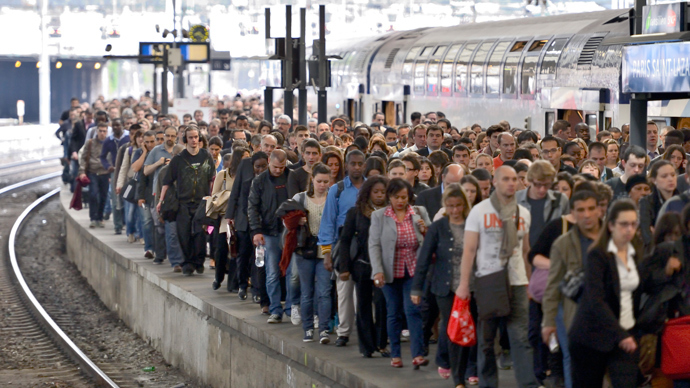France’s rail misery
April 4, 2018 | Expert Insights

Rail workers across France have planned three months of train strikes, leading to street demonstrations and chaos in transportation. The rail strikes are in response to President Macron’s changes in labor reforms. Employees of Air France are also on strike, demanding a 6% pay raise.
Background
The French rail transportation is operated mostly by SNCF, the French national railway company. France has the second largest European railway network, with a total of 29,901 kilometers of railway. However, the railway system is a small portion of total travel, accounting for less than 10% of passenger travel. Since 1981, the SNCF has operated the high-speed rail network TGV service, which has consistently expanded in subsequent years.
Railway construction began in France during the 19th century, primarily for mining. However, the construction of the main French railway system began only after 1842. In 1814, Pierre Michel Moisson-Desroches, the French engineer, proposed to Emperor Napoleon to build seven national railways from Paris, in order to travel "short distances within the Empire."
In 1823, the first railway company, Saint-Étienne to Andrézieux Railway, was authorized and the line was first operated in 1827, for goods, and for passengers in 1835. The French railways are known to have started later and developed more slowly than other European countries, as French progress failed to keep pace. Hence, France lagged behind Germany, Belgium and Switzerland in terms of trackage per person.
Unlike Great Britain or the United States, France did not have access to large substantial industrial base, leading to the involvement of the government in order to boost railway development. The eventual relationship between the French rail system and the government formed a compromise between two options:
- The completely laissez-faire, free-market system that had created Britain's elaborate rail network.
- Government-built and government-controlled railway, like that in Belgium.
France used a combination of the two models to construct its railways, but gradually submitted it to government control. Eventually, relationships between the government and private rail companies became complicated, resulting in many conflicts and disagreements between the two groups.
Analysis
The first day of the railway strikes, locally known as “Black Tuesday,” caused large-scale disruption to 4.5 million rail passengers across the country. Worried passengers in platforms across Paris crowded themselves on to the few operational trains, while railway workers and students marched through major cities.
Around three-quarters of train drivers and half of the indispensable rail staff walked off the job throughout the country. Presently, only one regional train in five and one high-speed TGV train out of eight is operational. Commuter lines into Paris were severely affected and international train services have been halted, with no trains running between France, Switzerland, Italy, and Spain and three out of four trains running on the Eurostar service connecting to London.
The strikes are being held against President Emmanuel Macron’s plan to push through sweeping changes to France’s extensive state rail system. This marks the first major test for Macron’s pro-business decision to liberalize the economy and loosen labor rules in the state sector. It also denotes the biggest industrial action against the president since he took office last year.
France’s rail sector is known as one of its riskiest political issues. Until now, rail reform was not included as a major part of Macron’s election platform of pro-business economic change. However, he proposed to cut special employment rights of rail workers and turn SNCF into a publicly listed company. This resulted in widespread agitation by workers saying the government would cut state debt and overhaul labor policies.
The government explains that the SNCF is heavily in debt and must be revamped and made more efficient before local and national passenger services open up to competition in the future under European Union rules.
Assessment
Our assessment is that the current strike will have broader implications as many union members see Mr. Macron as the man who wants to break the power of the unions. While just over 11% of the French force is unionized- one of the lowest in the EU, the unions rationally punch above their weight economically and politically. We believe that with tens of thousands of teachers, nurses, and other workers joining the rail staff, the strike could be more ominous now. We clearly see a threat to Macron and believe that he will have to work very hard to protect the legacy of his Presidency.








Comments